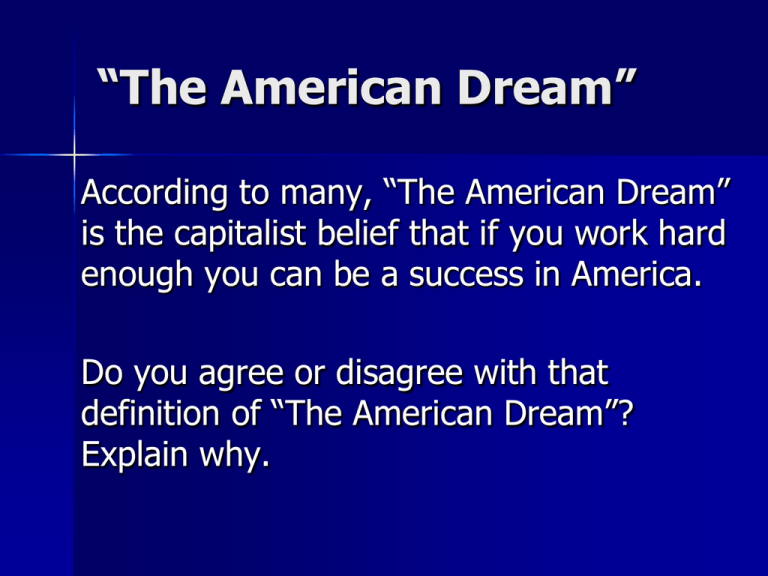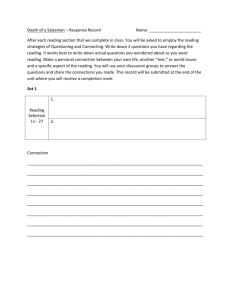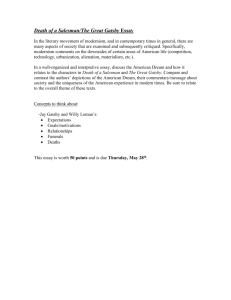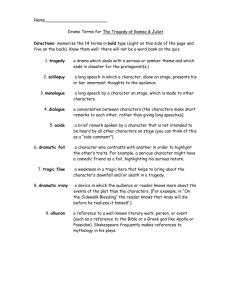Opening Activity
advertisement

“The American Dream” According to many, “The American Dream” is the capitalist belief that if you work hard enough you can be a success in America. Do you agree or disagree with that definition of “The American Dream”? Explain why. “Restoring the American Dream” Time Magazine November 1, 2010 Introduction Going Global Recapturing the Dream What We Need to Do Now The Work Ahead What is the current state of the American Dream and the American middle class? To what extent have America’s corporations gone global? What would be the wrong way to go about improving the American economy? How would each of the following strategies help the American economy? What is wrong with America’s current system of government? What are some possible solutions for improving the American economy? -Shift to investment How has globalization affected the American economy? -Training and education -Fiscal sanity -Benchmarks How did the term “American Dream” originate? Can the American Dream be restored? If so, how? Homework: Due Next Class Write a one-page essay (handwritten) in response to the question, What does the American Dream mean to you? Pay attention to: – Clarity of ideas and support – Organization/structure – Spelling/grammar Opening Activity We will be reading the play called Death of a Salesman. Write a prediction of what you think the play will be about. Consider different meanings of the word “death.” Essential Questions What is a tragedy, and why do we enjoy watching it? Is there anything to criticize about our American capitalist system? How do society’s values influence one’s ideas of success? How does one attain success in one’s life? How do one’s parents influence one’s own values, worldview, and morals? Is there such a thing as the American Dream, and do people ever attain it? Setting of Death of a Salesman Time: – Late 1940s – Structure: Most action takes place during 24 hours between Monday night and Tuesday night Daydreams/flashbacks into past occur frequently Requiem takes place a few days after Tuesday night Place: – Brooklyn, NY – Various places in New York and Boston Author’s Comments on Daydreams/Flashbacks “There are no flashbacks in this play but only a mobile concurrency of past and present…because in his desperation to justify his life Willy Loman has destroyed the boundaries between now and then.“ -Arthur Miller Salesmen in the late 1940s Obstacles: WWII (ended in 1945) Women went to work Struggling economy Distrust Beginning of television commercials http://www.youtube.com/watc h?v=m7t9YlMxWoE Establishing the Set Activity Read the staging directions on p. 11-12. Create a sketch of the set (with color). Write whether the set seems positive or negative, and include key words/phrases from the text that show the mood. Assignment Read the “Introduction” and “The Playwright” sections in your Death of a Salesman Study Guide. Answer the following questions in complete sentences (will be turned in). 1. Why does Death of a Salesman impact audiences? 2. What historical events may have influenced Miller in writing Death of a Salesman? 3. What are some connections between Milller’s life and Death of a Salesman? Casting for Death of a Salesman: Group Assignment Choose a modern actor to play each of the characters in the Loman family (Willy, Linda, Biff, and Happy), and then choose one additional character. (5 CHARACTERS TOTAL!) Create a PowerPoint slide for each character. – Write down each of the characters’ names and who will play them. – Include at least 3 sentences or bullet points explaining why the actors would be right for the role you’ve put them in. – Also, include a picture of each of the actors. The finished PowerPoint will be presented to the class. Willy Loman: Anthony Hopkins At the age of 73, he can pass for being Willy’s age, 63. Although he is from Wales, he can speak with an American accent. He is strong in intense, dramatic roles and in playing insane characters (The Mask of Zoro, The Silence of the Lambs). Comedy vs. Tragedy Comedy: – Light – Happy ending Tragedy: – Serious – Unhappy ending Is Death of a Salesman a comedy or tragedy? Elements of Tragedy Comic Relief - A bit of humor injected into a serious play to relieve the heavy tension of tragic events Tragic Hero - A privileged, exalted character of high repute, who, by virtue of a tragic flaw and fate, suffers a fall from glory into suffering Tragic Flaw - A character trait that leads the tragic hero to his/her own downfall or destruction How does Death of a Salesman incorporate these elements of tragedy? Requiem p. 137-139 Requiem= Mass celebrated for the dead – Epilogue= Postscript or addition after the ending Takes place a few days after Willy’s death Study Questions p. 137-139 1. 2. 3. Why is it a surprise to Linda that Charley and Bernard are the only people from outside the family to show up at Willy’s funeral? What is Biff’s understanding of his father’s life, and how is it different from Happy’s understanding of his father’s life? Why are the last words of the play, “We’re free”? Elements of Drama When characters speak in a play, their words can be… 1. Dialogue - Two or more characters conversing with each other 2. Monologue - A single character (on stage with others) speaking without another character’s response 2 3. Soliloquy - A single character (on stage alone) thinking out loud; a way of letting the audience know what is in the character's mind 4. Aside - A single character speaking words directly to the audience or privately to another character; not “heard” by other characters 1 3 4 When characters speak in a play, their words can be… Dialogue - Two or more characters conversing with each other Monologue - A single character (on stage with others) speaking without another character’s response Soliloquy - A single character (on stage alone) thinking out loud; a way of letting the audience know what is in the character's mind “Tragedy and the Common Man” After reading the essay, answer one of the following questions in a Claim, Evidence, Interpretation paragraph. 1. What causes readers to have “the tragic feeling” about a character? 2. What causes characters to develop a “tragic flaw”? 3. Why do readers tend to feel more passionately about a common tragic hero than they feel about a noble or high-ranking tragic hero? 4. Why does tragedy tend to show “more optimism than comedy”?



